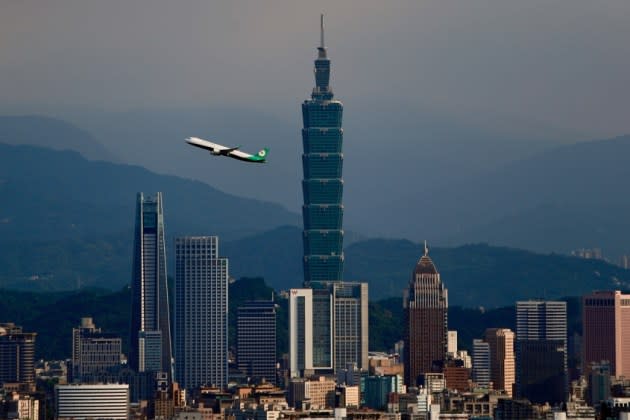Taiwan Drifts Towards Cultural Power as Golden Horse Film Awards Cap Month of Industry Activity

The Taipei Golden Horse Film Festival drifted to a conclusion in midweek, with project awards presented on Wednesday, followed by Thursday’s festival closing events. These involved a screening of portmanteau film “Tales of Taipei” followed by a sit-down dinner-cum-ceremony with a breezy pair of speeches and no prizes.
The film fortnight then sprang to life again on Saturday evening when the 60th edition of the Golden Horse Film Awards represented a new climax. The winners were announced at a ceremony at the Sun Yat-sen Memorial Hall.
More from Variety
'Stonewalling' and 'Old Fox' Take Honors at Taiwan's Golden Horse Film Awards
'Chewing Gum' Scoops Grand Prize at Golden Horse Film Project Promotion
For decades the Golden Horse awards had been the most prestigious prize ceremony in the Chinese-language firmament. That high profile has been harder to maintain over the last couple of years, given that the mainland Chinese industry is under government instruction to boycott the event, following a pro-independence speech given by an award winner at the 2018 ceremony.
Parts of the Hong Kong industry have stayed away too. Many Hong Kong film folks find themselves torn between the developing political and financial realities back home and Taiwan’s indie-spirited film industry, which more closely aligns with their own.
But, while politics lurk not far from the event, they do not dominate Taiwan entertainment either.
Unlike South Korea, another East Asian territory living in the shadow of a hostile nuclear-armed neighbor, and where films and TV series regularly delve into politics and recent history, Taiwan cinema struggles to be so direct and brash, and has more seldom tackled such narratives.
The festival’s Malaysian-Taiwanese opening film “Snow in Midsummer” has parallels with Hou Hsiao-hsien’s “City of Sadness” (one of the first films to probe Taiwan’s ‘White Terror’ era) in its examination of the anti-Chinese race riots in Kuala Lumpur that followed a 1969 election. With a presidential election in Taiwan some two months away, the allusions in “Snow” are obvious, but the film is ponderous and tangential.
The ten-unit “Tales” closing film is similarly timid. It is stacked with vignettes of everyday struggles, buzzing mopeds, individual spirituality and sexual allusions – the city’s giant 101 Tower seemingly standing in as a phallic symbol. The screen is populated with a succession of Taiwanese home favorite performers or their likenesses – supermodel-turned actor Lin Chi-ling is represented only as a cardboard cutout – as well as several Hong Kong performers, who may or may not be political refugees.
Yet Taiwan’s pre-election political circus was in high gear this week.
On Thursday, at the same Grand Hyatt hotel where many Golden Horse guests are lodged, two of Taiwan’s opposition, nationalist, China-friendly parties held a press conference that was intended finalize a coalition election ticket. Instead, it exploded into accusations of bad faith and disarray, such that the following day the parties registered separate candidates. That move splits the opposition and boosts the likelihood of Lai Ching-te, the current vice president and presidential candidate for the governing Democratic Progressive Party, winning the election. It also suggests that Netflix’s polished “Wavemakers” series about Taiwan politics is a sanitized depiction.
Going forward, it is not clear whether another DPP president, following incumbent Tsai Ing-wen, first elected in 2016, or a more China-leaning candidate would be better for Taiwan’s film and TV industries.
Tsai’s government has unveiled a succession of policies seemingly designed to use culture and entertainment to give the island territory a larger profile on the world stage. These include the launch of the Taiwan Creative Content Agency (TAICCA), a body that invests in and provides grants for the content industry and organizes the TCCF project pitching and rights market, and the 2021 launch of English-language streaming news platform Taiwan Plus.
TCCF, held for the fourth time earlier this month, was an efficient and bustling convention, that included some 60 film, TV and animation project presentations. It was marked by a succession of intergovernmental and corporate cross-border MOUs.
During Tsai’s first term, in 2019, Taiwan became the first territory in Asia to recognize same-sex marriages. In 2022 Audrey Tang, Taiwan’s first transgender cabinet member, was appointed minister for digital affairs. These may have helped Taiwan position itself as a leading purveyor of ‘BL’ (aka Boys Love) stories at the same time as its tech companies seek leadership positions in the VR and interactive entertainment sectors.
While Hou, Taiwan cinema’s grand master, may recently have retired due to ill health, there may be more to come from Taiwan’s younger generation. It remains to be seen if more of the TAICCA-seeded projects come to fruition. And if Taiwan’s film and TV companies are willing and able to fill the gap in the market created by Hong Kong’s production slowdown and by mainland Chinese entertainment’s inward turn of the past five years.
Best of Variety
Sign up for Variety’s Newsletter. For the latest news, follow us on Facebook, Twitter, and Instagram.
